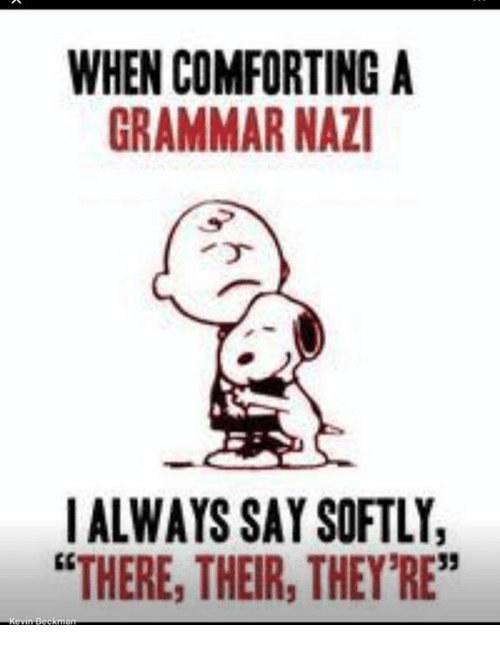Hi, my name is JayJay, and I’m a recovering Grammar Nazi.
An oppressive, all-around shitty term, it’s true. (How could I ever even fathom comparing poor grammar to the atrocities committed by the Third Reich?) It was another term I kind of just let be slathered all over me without putting in any critical thought as to why I was being called one. The equation seemed solid: JayJay Loves words + JayJay appreciates bibliophilic elegance + JayJay uses big words + JayJay also uses Standard American English + JayJay is a Writer = JayJay is a “Grammar Nazi.” Right? Sure, why not. Worse, I corrected people — all the time. I think, with 20/20 hindsight, I was attempting to share my passion for words and the wonderful things they can create–my intent wasn’t to oppress or harm, yet intent is not what matters. The impact is what matters. Still, I never refuted the term “Grammar Nazi,” as if the title proved a level of intelligence when in reality it proved a disregard for others who do not share my privileges, or who do not share my extreme intrigue regarding words and phrasing. What the Hell was I thinking?
Say, for example, I reblog something about a topic regarding reproductive justice; I agree with the topic, and want to share the insight of the author with others, but the author wrote “women” as opposed to “people with the capacity to get pregnant” and, since that is cissexist, I mention so in the re-blog to make sure the people I wish to share it with know the difference. Now, say, for example, that I am having a casual conversation with someone who says “me and the other person” instead of “the other person and I,” and I call them out on this; or, I see something that should be written as “you’re” written instead as “your.” It’s nearly second nature to comment with “I think you mean *you’re.” The difference between those two corrections is huge. One is mean, ableist, classist, and all else aside, just downright unnecessary. Cissexism has a legitimate impact on society; not using Standard American English in an everyday conversation does nothing to negatively impact that conversation and, most likely, only made the other party embarrassed and frustrated.
I’ve been working on unpacking this for a while now, and I probably will be unpacking it for quite some.
But what about my pronouns? I’m GenderQueer, and I’m Gender Fluid. How on earth am I supposed to describe myself? “He/Him/His” and “She/Her/Hers” aren’t correct. Xe/Hir just isn’t for me. What was I supposed to do–I can’t just not have pronouns, right? “They/Them/Theirs.” That resonates with me. Those would be perfect! Except they wouldn’t be perfect, because “They” is never supposed to be singular. It implies plural, the end. I couldn’t use those pronouns because then I’d be encouraging poor grammar by the whole world and at my hand. Wasn’t it my duty as a writer, as an autodidact linguist, to uphold the wonders of proper grammar? Well, wasn’t it?!
This was my line of thinking. It lingered even after I began actively disposing of my “Grammar Nazi” tendencies. It was always there; some part of me was always grappling with it. I respect other people using it–if someone told me their pronouns are “Mickey Mouse,” I will use that pronoun, as everyone should–because pronouns are important. But isn’t language important, too? I was angry, confused, reluctant to embrace my own pronouns for the utmost trivial reasons. (We’ve all been through that cycle before, identity can be, and is, difficult to reconcile.)
The light bulb didn’t go on suddenly. There was no “Eureka!” moment. No epiphany. It might have been a smoother transition if there was. Slowly, over time, I embraced it: first, a handshake; then, a handshake-hug; then, a hug; then a big bear hug; and then, finally, eye contact. The most important analogy is eye contact. Making eye contact with others is nearly impossible, so making eye contact with myself was unimaginable. Shakespeare used “They” as singular. (Perhaps he was even talking about a non-binary lover!) Others used it, inadvertently and unrelated to Queerness, as singular. (“I got a strange phone call today.” “Really? What did they say?”) And, despite any other reasons, why the Hell not?
As a Writer, more specifically as a Poet, it is not my duty to uphold and enforce rigid grammar. That’s the last thing I should be doing; I should be destroying grammar, building it up, knocking it down again, morphing it, twisting it, welding it, squeezing it for all it’s worth, milking dry every possibility–then stirring that milk into literary tea. And I had been, since day one. And I still do. And I probably always will.
Moreover, it is not my “duty” to police the language of others. It’s not my “duty” to do anything; it’s just an unabashed display of privilege. It is not my “duty” as a writer to erase my own identity in the name of grammar, either.
This is also a cautionary tale: it is not your duty to police grammar; it’s more than just ableist, classist, and unnecessary when grammar is prioritized over identity you’re doing nothing other than hurting people.





